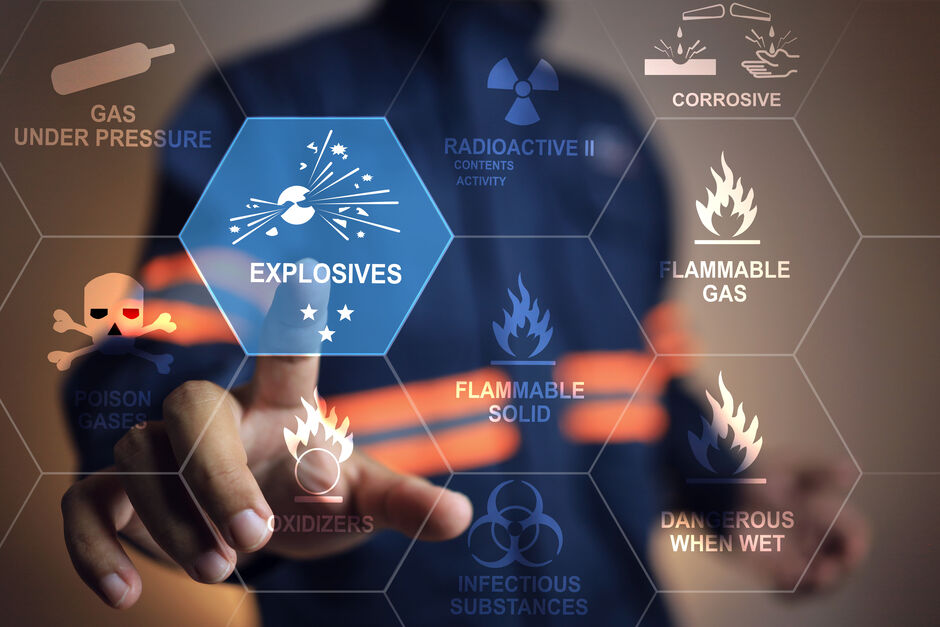DSEAR Online Course

2 Hours

Interactive

Cost effective

Convenient

Self-Paced
Dangerous substances come in many forms. Whether they’re already present on a site or produced as gases, dust or vapours from site activity, all workers should be aware of the dangers. In particular, those handling dangerous or explosive materials should know what’s expected of them, by law, to keep everyone safe.
This 2-hour online DSEAR training course covers the Dangerous Substances and Explosive Atmospheres Regulations, 2002 (DSEAR). It outlines the responsibilities of employers and workers in controlling dangerous or explosive substances in the workplace.
You’ll learn how to perform a risk assessment, what safety measures to put in place when working with dangerous substances, and what to do in an emergency.
This online DSEAR training course has been written by health and safety experts in accordance with UK legislation. There’s no time limit to complete the course, so you can work through at your own pace. It’s also accredited and assured by CPD and Royal Society for the Prevention of Accidents (RoSPA) Qualifications.
Objectives
By the end of this online training course, you will have a solid understanding of:
- The Dangerous Substances and Explosive Atmospheres Regulations, 2002 (DSEAR)
- The roles and responsibilities of employers under DSEAR
- The most common substances found in the workplace
- The kind of work associated with dangerous substances
- Various work activities covered by DSEAR
- Substances that are considered dangerous
- What an explosive atmosphere is
- Why fires start in the workplace
- When explosions happen in the workplace
- What happens in the event of a fire or an explosion
- How to prevent fires and explosions
- How to carry out a risk assessment for dangerous substances
- Key controls for safely transporting, handling and using dangerous substances
Agenda
Over 2 hours, this self-guided e-learning course covers the following topics:
- An introduction to The Dangerous Substances and Explosive Atmospheres Regulations, 2002 (DSEAR)
- What is a dangerous substance?
- What is an explosive atmosphere?
- The risks of various work activities
- Which activities are covered by DSEAR?
- The Regulatory Reform (Fire Safety) Order 2005
- The Petroleum (Consolidation) Regulations 2014
- When and where does DSEAR apply, under UK law?
- Who’s responsible?
- Reducing and mitigating the risks in your workplace
- Classification of hazardous zones
- Safety equipment and PPE
- Identifying potential hazards
- Using and storing petrol safely
- Risk assessments and key definitions
- What are the risks?
- Who could be harmed and how?
- Recording your findings
- Understanding and evaluating control measures
- What to do in an emergency
- The importance of keeping records up to date
- Fire safety and emergency procedures
- Flammable liquids: safe storage and transport
- Gas cylinders: safe storage and use
- Gases used for cutting and welding
- Case studies
- Hot work on tanks and drums
- Booths for paint spraying
- Flammable dusts
- Oxygen
- Make sure packaging is labelled accurately
- Safety data sheets
Assessment
At the end of this online DSEAR course you will be required to complete an online assessment consisting of 20 multiple choice questions. The pass rate is 85% or higher and answers are automatically marked so you’ll know instantly whether you passed. If you don't pass don't worry! You can take the test as many times as you need with no extra charge.
You’ll receive a CPD certified digital certificate straight away.
Who is this Course for?
Any worksites where dangerous substances are used, made or found should adhere to DSEAR, to prevent the risk of exposure to workers and site visitors. Therefore, it’s vital that everyone working in the following scenarios – regardless of their role – is aware of the dangers and how to avoid them.
- Construction sites
- Sewage treatment plants
- Grain silos
- Landfill sites
- Manufacturing sites
- Spray painting booths
- Transporting fuel and gases
- Mines
- Quarries
- Workshops
- Industrial premises
- Land-based installations
- Offshore installations
- Commercial premises
- Industrial estates
- Roadworks
- Public and private roads
- Domestic sites
- Vehicles
- Vessels
If you’re responsible for the health and safety of workers, or supervise operations, you should refresh your knowledge every year to keep up to date with the latest UK legislation.


